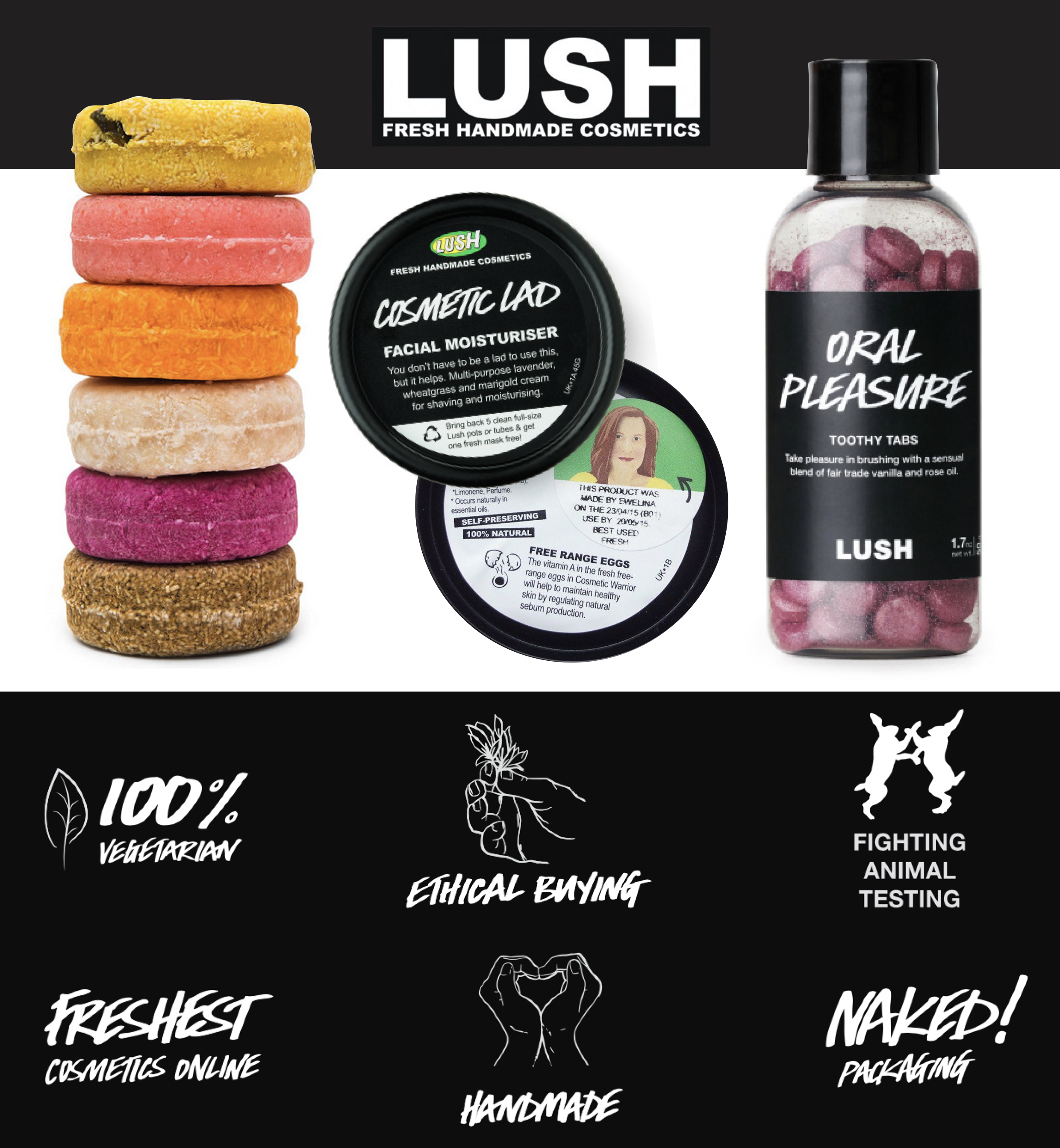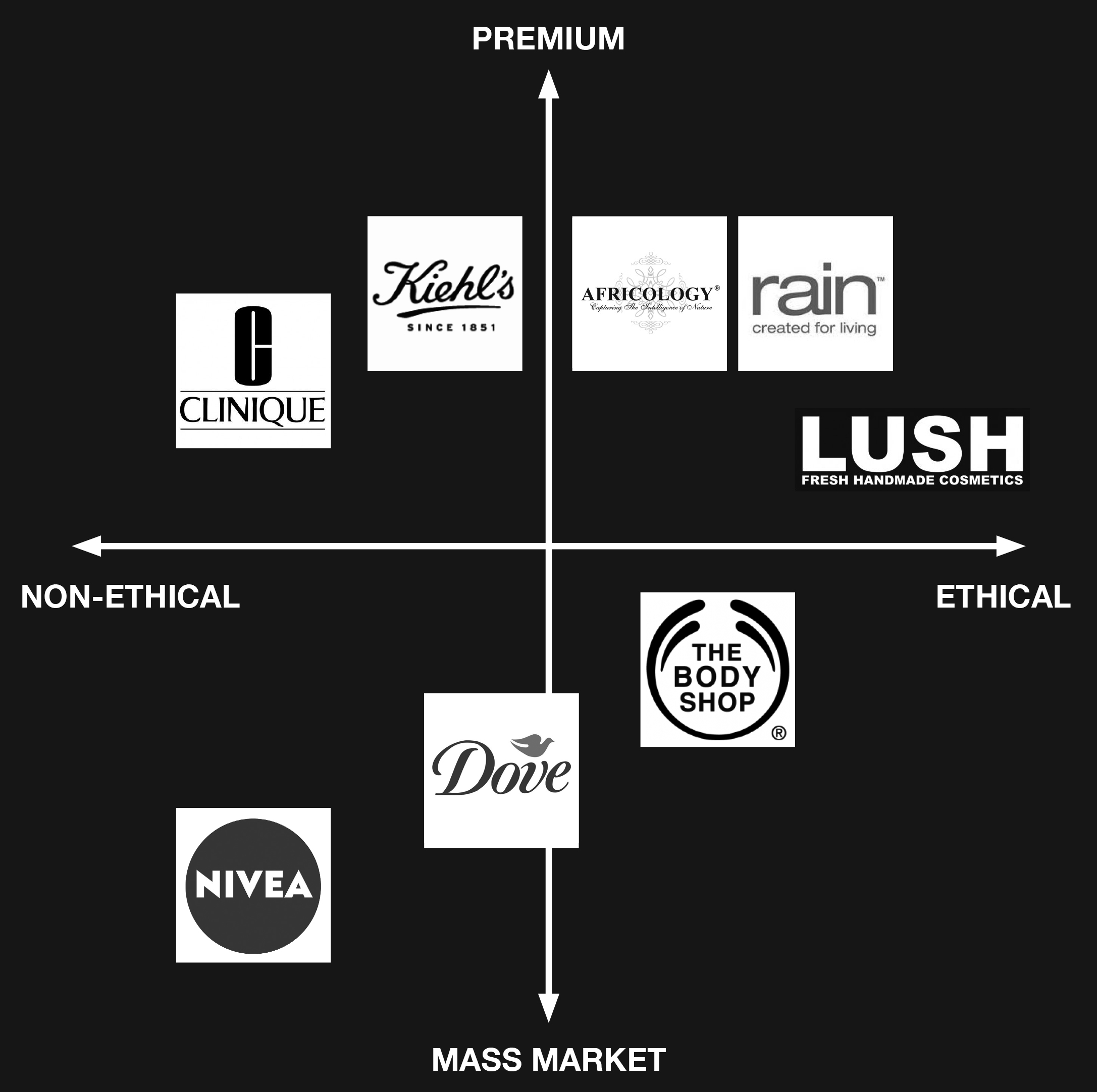A Nose For It: A Particularly Perfumed, Perfectly Positioned Cosmetics Brand (26/03/19)

Lush's brand differentiation and positioning take advantage of a gap in the market for a cosmetics brand heavy on ethical awareness and environmental friendliness. Their six primary values are apparent in all their touchpoints and also reflect in the brand's fun, witty verbal and visual languages. (Images: www.lush.com, www.google.co.za; Graphic: Martin Jacobs)
In 1995, in a coastal town in southern England, a new brand, Lush, set out to differentiate itself from competitors by attracting consumers in a most innovative manner, and one previously unexplored – through smell. No traditional media, be it print, television or radio, was employed in seducing consumers to experience this brand. Rather, on a sensory level, an enticing scent (heavy on minerals and earthiness) emanated from its stores and could be detected metres away, and was used to differentiate the brand from its competitors. Twenty-five years later, apart from the tremendous growth of the organisation, little has changed. This growth, evident in Lush having over a thousand stores in 49 countries, can be attributed in part to Lush's strategic brand positioning in a crowded cosmetics market, as well as its considered differentiation of its product and retail experience.
Launched in a pre social media era, the brand relied on ingenuity and originality to differentiate itself, and to deliver on the promises made to its target consumer. For most new customers today, if not through social media, this sensory engagement will be their first interaction with the brand, and coupled with an in-store experience that is friendly, tactile and reflective of the organisation’s values, will lead to the brand occupying a unique and unrivalled position in the consumer’s mind.
Having conducted market research to identify and define Lush’s targeted consumer (she is a late-teens to mid-thirties, ethically-minded and health-conscious woman, keen to have fun and self indulge whilst still remaining empathetic to sustainability issues), Lush’s founders Mark Constantine and Liz Weir could determine how best to position the brand. Positioning Lush may have involved drawing up a perceptual map to help identify the quadrant (ethical or not, boutique or mainstream) in which the brand intended to exist, whilst differentiating the brand included determining through what visible or tangible means this position could be communicated to the consumer. This process included understanding the consumer's needs, and considering the ideal way to communicate the brand's capability of fulfilling these needs.
One way of communicating how Lush could surpass its competitors in this regard was through a carefully considered tagline: Fresh Handmade Cosmetics. This is a strong indicator that there is more to the brand's differentiation than simply fragrance. In this context, the adjective ‘fresh’ was chosen to speak of purity of ingredient, ‘handmade’ selected to suggest artisanal integrity, and ‘cosmetics’ chosen to indicate parity within the category class. With a promise like this, the founders were certain that the brand would appeal to an audience eager to offer loyalty, and to spread the brand’s values.

Cleverly implemented store design, that mimics a grocer in its inclusion of wooden crates, packaging-free products and handwritten signage (in a font created exclusively for Lush), is a major component of the brand's differentiation. (Images: www.theprettysecrets.com
In further distinguishing itself from its competitors, it was imperative for Lush to communicate to its consumer, in a multitude of touch points, its values, which are also its brand differentiators. Co-founder and product inventor Rowena Bird says the brand “believes that true sustainability should cover environmental, social and economic impacts.” She continues, “Our long-term vision is to create supply chains that are not only sustainable but regenerative, giving back more than they take in resources.” A quick glimpse, be it of Lush's store interiors, product labelling or website, easily reveals how this vision translates into cruelty-free and environmentally friendly credentials. These include a zero animal-testing policy, a less-is-more approach to packaging, fresh vegetarian handmade products, and an ethical attitude towards sourcing ingredients.
These were to be the brand's primary differentiators. They amount to great points of difference, as well as offer consumer clarity, when comparing Lush to its competitors. The Body Shop, arguably the organisation's closest competitor in terms of ethical concerns, measures up to a limited number of these brand attributes. Other rivals – including boutique brands Kiehl's, Africology and Rain (the latter two only in a South African market) and more mainstream brands, including Dove – measure up to an even lesser extent.

A perceptual map indicating Lush's positioning as a brand relative to its competitors in the cosmetics market. (Graphic: Martin Jacobs)
The importance of brand differentiation and positioning is vital in the following localised example. In the V&A Waterfront mall in Cape Town, Lush occupies store premises mere metres from The Body Shop. Also within immediate proximity, are competitors Africology and Rain, both of which pose a threat to the Lush store. Over and above Lush’s wafting scent, its quirkily differentiated store design awards it a competitive advantage in such a context. For in addressing the issue of store design, Lush appeals to the fun-loving and self-pampering nature of its consumer, far more so than its rivals. Referencing the integrity of its brand positioning, Lush bills itself as a cosmetics ‘grocer’ (with all the consumer perceptions that come with such a title). Resultantly, store interiors reflect deli attributes: wooden, crate-like shelving, sampling and wash stations, chalkboard signage, friendly knowledgeable employees and, very importantly, chunks of product ready to be sliced down to consumer-specified sizes.
This immersive retail experience, reflective of the brand's differentiation, is in stark contrast to the environment of a Body Shop or Red Square cosmetics store, for example, heavy on pre-packaged, plastic-sealed products and often user-unfriendly displays. (Yet, interestingly, whilst Lush rejects packaging for many of its products, others come in more traditional forms – recyclable pump-bottles and tubs – ensuring a visual parity with competitor offerings.) Lush’s is a touch point that is at once engaging in experience, and which leaves the consumer with the enhanced perception of an environmentally friendly brand, rich with emotional benefits and reflective of brand values. The tactile nature of Lush’s in-store experience awards it a competitive advantage in an aggressive retail context like that of the V&A Waterfront mall.
Such a positioning, with strong differentiators, easily places Lush in a winning zone when it comes to addressing consumer needs, for no other cosmetics company boasts such an ethically- and sustainably-considerate offering. One of the outcomes of this lack of direct competition is that Lush has the competitive advantage of being able to price its products in a premium market space, relatively undetermined by competitors. Another competitive advantage is that word-of-mouth becomes a strong marketing tool requiring no organisational expenditure, for within such an ethically-aware consumer community, conversations on subjects including waste, fair-trade, and recycling are likely to lead to informal discussions about the advantages of the brand. Such outcomes ensure brand relevance and consumer loyalty. Resultant from a unique value proposition, communicated in part through the remarkable ingenuity and originality of its differentiation and positioning, Lush as a brand is made all the more easy on the nose.
Martin Jacobs
(module 4, assignment 4.7)

All Lush's offerings, from the 'Lush Player' video platform covering ethically-minded concerns, to product packaging mentioning proceeds donated to charity, are true to the organisation's positioning. (Images: www.lush.com; graphic: Martin Jacobs)
Bibliography:
Tennant, J. #SustainabilityMonth: Life’s Too Lush For Normal Cosmetics, Q&A With Co-Founder Rowena Bird. Available: https://www.bizcommunity.com/Article/196/457/151534.html (2016, October 04)
Shepard, B. 10 Companies That Brilliantly Differentiate Themselves From The Competition. Available: https://blog.hubspot.com/insiders/branding-differentiation (2019, January 10)
West, P. Lush Brand Book. Available: https://issuu.com/poppywest99/docs/brand_book_dropbox (2018, May 19)
Rutter, H. Lush Brand Book. Available: https://issuu.com/hollierutter1995/docs/final_copy_-_pdf (2017, April 28)
Gilliland, N. How Lush Delights Customers With Brand Marketing, Strong Values and Digital Innovation. Available: https://econsultancy.com/how-lush-delights-customers-with-brand-marketing-strong-values-and-digital-innovation/ (2017, September 04)
Quotation:
Rowena Bird: from #SustainabilityMonth: Life’s Too Lush For Normal Cosmetics, Q&A With Co-Founder Rowena Bird
Comments
Post a Comment